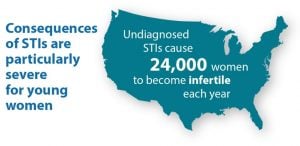There is no such thing as a bad question. Uncomfortable? Maybe. But our hope is that our patients can ask us anything about pregnancy, prevention, and their sexual health without judgment. For Sexual Health Awareness Month, we wanted to tackle some of the most commonly asked questions and misconceptions on sexually transmitted diseases, prevention, and self-worth.

MYTH #1
If I had an STD, I would know it.
STD and STI symptoms are often not obvious. Did you know a symptom of chlamydia is a sore throat? There are a lot of symptoms that can mimic run-of-the-mill viruses or bacterial infections.
According to the CDC, 1 in 5 sexually active adults has a sexually transmitted infection. Gonorrhea and Chlamydia are two of the most common STIs and it’s estimated that half of all women don’t show symptoms.
MYTH #2
My worth or identity is tied to my sexuality.
Your worth or identity isn’t tied to who you’re with or what you’ve done!
Too often sex is used as a bandage for complicated feelings when what we all really want is to feel loved and valued. You are worthy of love – real love – no matter how messy or complicated things are and no matter what anyone else says.⠀
If you’re on a bad cycle and want to learn more about how to make healthier decisions with sex and relationships, come see us. You’ll find no shame, no condemnation, just love, compassion, and encouragement.
MYTH #3
I’m not at risk for STDs or pregnancy if I always use contraception.
It’s a myth that contraceptives are a foolproof method against pregnancy and they do not protect against STDs. According to the National Institutes of Health, nearly half of all unexpected pregnancies occur while using a contraceptive method. Condoms, when used consistently and correctly every time, can reduce the risk of an STD, but do not eliminate the possibility.
MYTH #4
No one is celibate or abstinent anymore.
According to the Institute for Family Studies, college-educated women in their mid to late 20s are almost three times as likely as other women to be celibate. Waiting Till Marriage, an organization that collects data on sexual health decisions, shows that millions of Americans choose to wait to have sex until marriage.
The truth is, we live in such a sex-saturated culture that people who choose to wait, or decide to be celibate again, often feel like they’re the only ones. If this is you, you’re not alone.
You don’t have to be vocal about your status to everyone, but if you’re in a relationship, it’s important to share your boundaries and goals with your partner. A person who truly values you will respect your decision to wait.
MYTH #5
I’ve only had oral sex, so I don’t need to get tested. I had an STD, I would know it.

If you’re having sex – any form of sex – you need to get tested. That means even if you’ve never had intercourse, but engage in oral or anal sex, you’re putting yourself at risk for an STI or STD. While other forms of sexual activity may not carry a risk of pregnancy, there are both emotional and physical side-effects to any form of sex.
MYTH #6
Sex is expected. If I don’t put out, he’ll move on.
Sadly, this can be true for some people. However, in a healthy relationship, this is never true. If someone respects you, they respect ALL of you – boundaries and feelings included. True consent means someone won’t push, bully, or coerce you into sex.
If you’re in a relationship where you feel coerced or pressured, move on. You deserve better. You deserve respect.
MYTH #7
Porn is a great alternative to sex.
To avoid STDs, STIs, and unplanned pregnancy, porn may seem like a logical alternative. But the truth is watching porn not only harms your brain, can cause an addiction, decreases natural drive, but it also contributes to human trafficking. There is a laundry list of reasons why consuming porn can hurt your health and cause future relationship problems too.
We love resources like Fight the New Drug that educate on porn and help women and men live free from porn.
When it comes to sexual health and relationships, some great questions to ask are –
- Will the choices I’m making today give me the future I want?
- What can I do to best protect myself and my desired future?
- If I’m making any destructive decisions, how can I change?
We can help you answer these questions and so much more. We believe you deserve a healthy relationship filled with love and respect, your past does not determine your future, and change is possible with help.
If you need someone to talk to or you don’t know where to start, reach out confidentially today.

